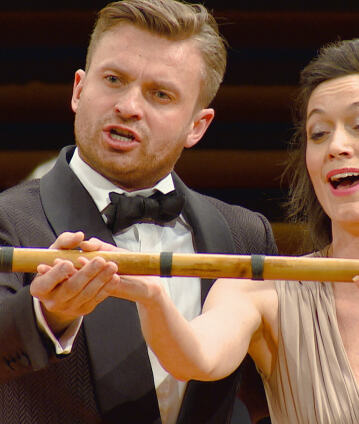Simon Rattle conducts Mozart’s “Magic Flute”

Mozart’s Magic Flute was the highlight of the first Easter Festival in Baden-Baden in April 2013. Following the festival, the orchestra also gave a concert performance of the production in which the singers enchanted the audience with both their vocal and dramatic skills. Simon Rattle also revealed himself to be an excellent interpreter of Mozart, bringing out the whole transparency, tonal beauty and drama of the score.
Singspiel, magical extravaganza, popular theatre, mystery play, didactic theatre, parable – Wolfgang Amadeus Mozart’s final stage work has been assigned to the widest range of theatrical forms. No surprise, given that the libretto from the hand of the composer’s actor friend and impresario Emanuel Schikaneder is a conglomeration of various sources: The tale Lulu oder die Zauberflöte from a collection of fairytale by Christian Martin Wieland, Paul Wranitzsky’s opera Oberon, the Egyptian novel Séthos by the French Abbé Jean Terrasson and many other works, they could all be seen as inspiration for Schikaneder’s libretto.
An opera entitled Kaspar der Fagottist oder: Die Zauberzither, premiered three months before the Magic Flute in Vienna, even caused Schikaneder to make significant changes to the piece while he was writing it, as the similarities were too great. Mozart’s music has also long been subsumed among the numerous inconsistencies of the libretto – unjustly, as no other than Richard Wagner recognised: for what “did Mozart built on this strange adventurous basis! What divine magic wafts through this work, from the most popular songs to the most sublime of hymns! What versatility, what diversity! What simple yet elegant popularity in every melody, from the simplest to the most powerful!”
© 2013 Berlin Phil Media GmbH
Related interviews